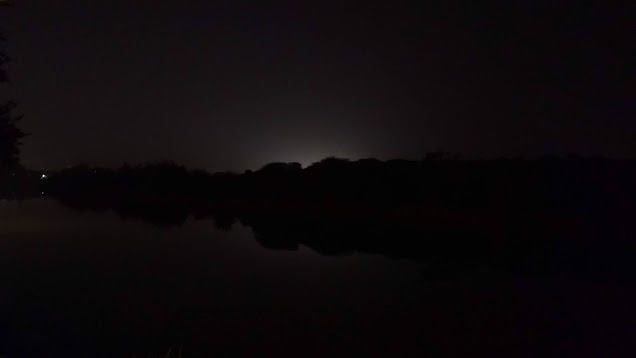From
the beginning of childhood, our parents advised us or anyone of our family
members to go out ay night or on no moon day. The reason they
would reply if asked would be, it's a bad omen to go out on no moon day, some argue
that bad things would occur if you go out on that day. But the main reason
behind it is because of the darkness. After all, It's
not too uncommon for adults either. When we're young, being afraid of the dark goes
hand in hand with some other fears, like ghosts, monsters, or other spooky things.
Some survey results, including one sample of over 1,000 children and teenagers,
suggest that we might learn these fears because of modeling. Like, when your
older brother sees a spider and freaks out, so you do too.
 |
Human kind’s fear of the dark roots
back from the days of early humanity, long before we evolved into modern
humans. Humans haven’t always been at the top of the food chain. Our earliest
human-like ancestors first appeared around seven million years ago. That’s a
long time that humans had to defend themselves against the natural threats from
predators such as lions, wolfs, tiger, crocodiles, and also from reptiles such
as snakes that they shared their places with. Our early human ancestors didn’t stand a
chance against these predators, without modern tools or shelter. This problem
was made even worse during the night. Predators used the pitch black of the
night to their advantage. A lonely defenseless human wandering the planes
didn’t stand a chance in the dark. After all, predators can see in the dark
considerably better than humans.
Some ecologists looked into an
evolutionary reason for fearing the dark, based on risk from predators, by
studying some regions of Tanzania where lion attacks are a threat to humans. Using
data from 1988 and 2009 and over a thousand lion attacks, they found that 60%
of lion attacks occurred right between the dark hours of 6 pm and 9:45 pm when
it’s dark but people are still wandering around. But they also found that
attacks were up to four times more common in the ten days after a full moon
than the period before, which is when the darkest part of the night is also right
after sunset. So if that pattern of lions attacking humans in the dark was also
true millennia ago, it's also possible that some early humans became
conditioned to fear the dark moon. Scientists have guessed that people might be
predisposed to be afraid of the dark because we adapted to a risk of predator
attacks. But this is one of the first studies suggesting that darkness increased
that risk. Especially, because in the dark, we can’t see where we’re going and
we have no idea what hostile creature might be coming towards us.
Over millions of years, this fear has been fine-tuned by both nature and nurture to keep us safe from the perils of the night. You see it’s not just a natural selection that enforces this fear. Millions of years of children seeing their parents become worried & afraid when going out at night, and more recently, mother’s telling their children not to go out past eight o’clock or in someplace passing a myth of bad omen on no moon day, which has helped to reinforce and improve human kind’s ability to stay anxious and fearful of the dark. This ability may not be as relevant nowadays, because we no longer have to contend with ferocious wild animals daily. But even in our modern world, the night still holds many threats, most of the human variety. So we should be very thankful for our fear of the dark, because it offers at least a modicum of protection, constantly reminding us not to tread where danger may lurk.







0 Comments